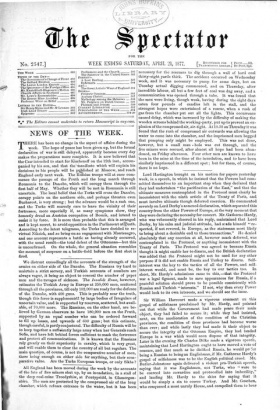Sir William Harcourt made a vigorous comment on this gospel
of selfishness proclaimed by Mr. Hardy, and pointed out that while the Government bad made peace their main object, they had failed to secure it; while they had insisted, next, on the amelioration of the condition of the Christian provinces, the condition of these provinces had become worse than ever ; and while lastly they had made it their object to secure the integrity of the Ottoman Empire, they had landed Europe in a war which would soon dispose of that integrity. Later in the evening Sir Charles Dilke made a vigorous speech, maintaining that Lord Hartington ought to have moved a vote of censure, and that much as he disliked Russia, he would pr,!er being a Russian to being an Englishman, if Mr. Gathorne Hardy's gospel of selfishness was to be the English political creed. Mr. Butler-Johnstone again delivered a violent pro-Turkish speech, saying that it was Englishmen, not Turks, who " were to be coerced into cowardice and protocolled into imbecility," and lauding Mr. Hardy to the skies for saying that it would be simply a sin to coerce Turkey. And Mr. Goschen, who conquered a most unruly House, and compelled them to hear
his able speech with attention and respect, showed that by pro- mising to regard the Protocol as null and void, if there were no disarmament, Lord Derby had put a premium on Turkey's refusal to disarm, and given her in fact that very pledge she wished for, that by ignoring the Protocol she would break up the con- cert of Europe. The Protocol was not a bridge of gold, but of snow, "built by Russia during the time of her own snows, and now melting under the April sun." Of the Chancellor of the Exchequer's final reply we have said enough in another page. The motion for further papers was refused, and finally withdrawn.



































